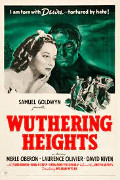
Directed by
William Wyler
104 minutes
Rated PG
Reviewed by
Bernard Hemingway

Wuthering Heights (1939)
William Wyler’s adaptation of Emily Brontë’s classic 1847 romance novel told in flashback by Wuthering Height’s housekeeper Ellen (Flora Robson) opens when Cathy and her brother Hindley are children. Their kindly widowed father (Cecil Kellaway) brings home a vagrant boy of their age and tells them that he will be living with them as part of the family. Whilst Cathy befriends him Hindley becomes obdurately jealous and the scene is set for the tragedy to come. We jump a decade or so forward in time. The father has died and Heathcliff (Laurence Olivier) is possessed by an unrequited love for Cathy (Merle Oberon). She recognises his feelings but she also recoils from his untutored couthness, exacerbated by the tyrannical treatment to which Hindley (Hugh Williams) has subjected him over the years. Unlike him she yearn to join society, in particular that of the Linton family. Long story short, Cathy marries Edgar Linton (David Niven). Heathcliff leaves Wuthering Heights, returning some years later transformed and, thanks to Hindley’s gambling debts, its owner. He tries to win back Cathy but their love is blighted and they can only find love in death.
Scripted by the unlikely team of Ben Hecht and Charles McCarthur (with ucredited contributions from John Huston) who are best known for their work in the comedy and gangster genres the film focusses on the passionate relationship between the two star-crossed lovers, effectively eliminating the second volume of the original two volume text. Whilst this may be disappointing to Brontë fans it keeps the film dramatically intense although the doctored ending which is very much in the Romantic tradition is less justifiable artistically if not commercially. (Wyler didn’t want to do the scene but producer Samuel Goldwyn insisted on it and it was added after primary filming was complete using doubles).
The main attractions of the film areOlivier and Oberon. In a role which Vivien Leigh who was in a real life relationship with Olivier had wanted to play but was rejected for being relatively unknown in America, Merle Oberon who had become a star thanks to The Private Life of Henry VIII (1933) gives what many would regard as the best performance of her career as the conflicted Cathy. Olivier was less suited to the part of Heathcliff wanting in the surly charisma that would keep Cathy returning to him. As a result at times he tends to fall back on his stagecraft and can be easily accused of overacting by filmic standards. Although apparently Oberon and Olivier did not get on at all, presumably due to Wyler’s direction, the dynamic between Heathcliff and Cathy does justice to the novel (although it is not as effective as that between Rhett and Scarlett in Gone With The Wind which was released the same year).
Not as much is made of the setting of the bleak Yorkshire moors and the gloomy interiors as you might expect but Gregg Toland won an Oscar for his impressive black-and-white cinematography (he would go on to immortality for his work on Citizen Kane two years later. On the other hand Alfred Newman score is overweeningly literal albeit very much in the style of the times.
FYI: After failing to land the role of Cathy, Leigh was cast in Gone with the Wind, for which she won an Academy Award for Best Actress. Ironically, Oberon did not even receive a nomination.
Want something different?





